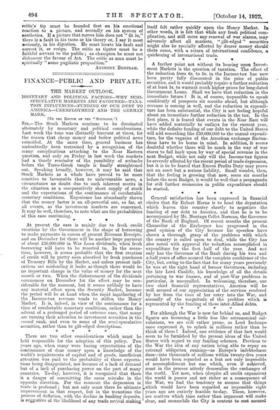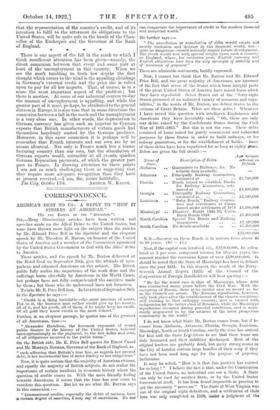FINANCE—P1JBLIC AND PRIVATE.
THE MARKET OUTLOOK.
MONETARY AND POLITICAL FACTORS—WHY SEMI- SPECULATIVE MARKETS ARE FAVOURED—TAXA- TION INFLUENCES—FUNDING OF OUR DEBT TO AMERICA—UNEMPLOYMENT AND THE GERMAN MARK.
[To THE EDITOR OP THE " SPECTATOR.") Sin,—The Stock Markets continue to be dominated alternately by monetary and political considerations. Last week the tone was distinctly buoyant at times, for the reason that cheap money and better political news coincided. At the same time, general business has undoubtedly been restrained by a recognition of the many complications attaching to the Near Eastern question, and only on Friday in last week the markets had a timely reminder of the possibility of setbacks before the Turco-Greek tangle is finally straightened out. Speaking broadly, however, it may be said that Stock Markets as a whole have proved to be more sensitive to favourable than to unfavourable news, a circumstance no doubt due to such inherent merits in the situation as a comparatively short supply of stock and the expectations of the continuance of comfortable monetary conditions. Experience has abundantly shown that the money factor is an all-powerful one, so far, at all events, as the investment markets are concerned. It may be well, therefore, to note what are the probabilities of this ease continuing. * * * At present the ease is mainly due to fresh credit creations by the Government in the shape of borrowing to make payments in excess of present Revenue Receipts, and on December let there will be another large payment of about £50,000,000 in War Loan dividends, when fresh borrowing will have to be resorted to. In the mean- time, however, it seems probable that the first creation of credit will be pretty soon absorbed by fresh purchases of Treasury Bills by the Market, and unless present indi- cations are misleading it looks as though there would be no important change in the value of money for the next month or two. When the disbursement of the dividends commences on December let the effect may be con- siderable for the moment, but it seems unlikely to have any material effect upon the Security Market, because the period will be at hand when the rapid irtgathering of the Income-tax revenue tends to stiffen the Money Market. It is, indeed, in view of the continuance for a time of comfortable monetary conditions, rather than the advent of a prolonged period of extreme ease, that many are turning their attention to investment securities in the second rank, and even to some of the semi-speculative securities, rather than to gilt-edged descriptions. * * * There are two other considerations which must be held responsible for the adoption of this policy. Two years ago, when many were basing expectations of the continuance of dear money upon a knowledge of the world's requirements of capital and of goods, insufficient attention was paid to the probability of those expecta- tions being disappointed, not because of a lack of demand but of a lack of purchasing power on the part of many countries. To-day, however, it is recognized that there is a danger of committing the same mistake in the opposite direction. For the moment the depression in trade is profound ; but not only must there be ultimate improvement in that respect, but in the meantime the process of deflation, with the decline in banking deposits, is suggestive of the likelihood of any trade revival making itself felt rather quickly upon the Money Market. In other words, it is felt that while any fresh political com- plication, and still more any renewal of war alarms, may adversely affect all markets, " gilt-edged " securities might also be specially affected by dearer money should' there come, with a return of international confidence, a quickening of international trade. * * * A further point not without its bearing upon Invest- ment Markets is the question of taxation. The effect of the reduction from 6s. to 5s. in the Income-tax has now been pretty fully discounted in the price of public; securities, and it would probably require a further reduction of at least ls. to warrant much higher prices for long-dated Government Loans. Shall we have that reduction in the immediate future I It is, of course, impossible to speak confidently of prospects six months ahead, but although revenue is coming in well, and the reduction in expendi- ture has been substantial, the City is not feeling hopeful about an immediate further reduction in the tax. In the first place, it is feared that events in the Near East will have added materially to outlays for the current year, while the definite funding of our debt to the United States will add something like £50,000,000 to the annual expendi- ture, for the vagaries of the American exchange fluctua- tions have to be borne in mind. In addition, it seems doubtful whether there will be much in the way of war stores to fall back upon by way of special revenue in the next Budget, while not only will the Income-tax figares be severely affected. by the recent period of trade depression, but it is to be feared that Excess Profits Duty may prove not an asset but a serious liability. Small wonder, then, that the feeling is growing that now, some six months before the next Budget, it would be well that a propaganda for still further economies in public expenditure should be started.
General satisfaction has been expressed in financial circles that Sir Robert Horne is to head the deputation which leaves this country shortly to negotiate the funding of our debt to America, and that he is to be accompanied by Mr. Montagu Collet Norman, the Governor of the Bank of England. Of recent months the present Chancellor of the Exchequer has progressed in the good opinion of the City because his speeches have shown a thorough grasp of the problems with which the country is called upon to deal, while the City has also noted with approval the reduction accomplished in expenditure for the first half of the year. And not only has the Governor of the Bank during his two and a-hall years of office secured the complete confidence of the City, but, owing to the fact that for many years previously he was at the right hand of former Governors, including the late Lord Cunliffe, his knowledge of all the details pertaining to war finance, and of post-War problems in particular, is unequalled. In welcoming, therefore, our two chief financial representatives, America will be well assured of our appreciation of the services rendered by her from the time of her entry into the War, and secondly of the magnitude of the problem which is represented by the funding of these inter-Allied debts. * * * * For although the War is now far behind us, and Budget figures are becoming a little less like astronomical cal- culations, we are still rather prone, as Lord Inchcape once expressed it, to splash in millions rather than to think of them I Indeed, one evidence of that fact would seem to be furnished by the present ideas of the United States with regard to any funding schemes. Previous to the War the idea of any nation being able to repay an external obligation running—as Europe's indebtedness does—into thousands of millions within twenty-five years would have been regarded as a feat not only impossible of accomplishment but one which, even if achieved, must in the process utterly demoralize the exchanges of the world. Yet now, when (despite all credit expansion) the world is poorer and not richer as a consequence of the War, we find the tendency to assume that things *which would have been regarded as impossible eight years ago are entirely feasible to-day. These, however, are matters which time rather than argument will make clear, and meanwhile the City is content to rest assured that the representation of the country's credit, and of its intention to fulfil to the uttermost its obligations to the United States, will be quite safe in the hands of the Chan- cellor of the Exchequer and the Governor of the Bank of England.
There is one aspect of the fall in the mark to which I think insufficient attention has been given—namely, the direct connexion between that event and some part at least of the unemployment in this country. When we see the mark tumbling to fresh low depths the first thought which comes to the mind is the appalling shrinkage in Germany's external credit and the price she is called upon to pay for all her imports. That, of course, is in a sense the most important aspect of the problem ; but there is another. At some of our industrial centres to-day the amount of unemployment is appalling, and while the greater part of it must, perhaps, be attributed to the general distress in Europe, it is also true that in some directions the connexion between a fall in the mark and the unemployment is a very close one. In other words, the depreciation in German currency has given such an impetus to German exports that British manufacturers of certain goods find themselves hopelessly ousted by the German producer. Moreover, in this same connexion it is perhaps well to remember that French interests and our own are by no means identical. Not only is France much less a manu- facturing country than our own, but the stimulation of German exports would, ostensibly at all events, quicken German Reparation payments, of which the greater part goes to France. In drawing attention to these points I am not so much challenging them as suggesting that they require more adequate recognition than they have at present received.—I am, Sir, yours faithfully,



































 Previous page
Previous page